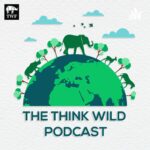
The African Wild Dog, more aptly known as the Painted Dog, is the largest wild canid species found in the entire African continent. The species is one of the rarest large carnivores in the world with the population of the species crashing from around 500,000 a hundred years ago, to an estimated 6,600 adult individuals today. It is for this reason that the species is listed as “Endangered” on the IUCN Red List.
In the 20th century, Painted Dogs were immensely persecuted by farmers due to supposed livestock depredation by the species. Currently, the species is primarily threatened by habitat fragmentation, particularly as a consequence of the development of roads and other linear infrastructure within their range. Not only does this increase the number of dogs lost to road kill but increases the risks of human-wildlife conflict. Additionally, the social nature of the species, makes the Painted Dog highly susceptible to diseases, such as rabies, distemper and parvo-virus, often transmitted from free-ranging dogs.
In this episode of The Think Wildlife Podcast, I interview Dr. Gregory Rasmussen, who is the Founder of Painted Dog Research Trust. Gregory is one of the leading scientists working on painted dogs in Africa. We discuss the conservation of the Painted Dogs and a variety of PDRT’s projects, which include the Kazungula Road project, dog collaring, and den protection initiatives.
If you enjoyed this podcast, do not forget to share and subscribe! You can also listen to The Think Wildlife Podcast on other platforms, such as YouTube, Spotify and iTunes.
Get full access to The Think Wildlife Podcast at anishbanerjee.substack.com/subscribe
